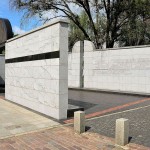[NOTE: This blog post originally appeared on 18 October as a Facebook post on the Moshe Rynecki: Portrait of a Life in Art page. I am sharing it here as well because I think it’s an important story to hear and because I know that not all my blog readers check my Facebook page.]
This afternoon we visited Nalweki street, the place where grandpa George’s sister was murdered. Then we walked towards the memorial at Umschlagplatz, the place where the Germans forced Jews from the Warsaw Ghetto to gather for deportation. The monument was erected in 1988 and is intended to look like an open transport train car. On the wall are inscribed the 400 most popular Jewish-Polish first names, in alphabetical order from Aba to Żanna. Each one commemorates 1,000 victims of the Warsaw Ghetto. Visiting the memorial in and of itself is a powerful experience. Unfortunately, my visit was even further traumatized by a very negative encounter with a chaperone/guard from an Israeli student tour group.
Slawomir (my cameraman) and I had planned that we would film me crossing the street towards the Umschlagplatz memorial. As we reached the corner, there was a large group of Israeli students who then became part of the scene. Upon reaching the other side a tall and imposing chaperone/guard aggressively confronted Slawomir.”You can’t shoot here,” he said. “You’re bothering our group and invading our space.” Slawomir explained we were filming a documentary and that I was the subject. The man would hear none of it. He threatened to call the Polish police and insisted Slawomir show him his footage. Slawomir told him it is a documentary film and that the man had no right to see the footage. The man shoved his cellphone in Slawomir’s face and told him he was taking his photo. I stepped forward and handed the man a large postcard showing my great-grandfather’s artwork and explained the Rynecki family art and story. I thought perhaps the story would interest him – that it would make a connection to his own reason for making a journey to Poland, that we might bond over the shared losses of the Jewish people. He wouldn’t have anything to do with me. He didn’t want to touch the card, look at the card, or hear what I had to say. I folded the card in half and put it in his shirt pocket. He said, “don’t touch me. I don’t want your card.” I said “fine, throw it away.” Then he followed us into the memorial, threw the card down on the ground, and continued to verbally harass us. I asked him to leave. He said, “it’s a public place, I can be here.” I said some choice words as tears streamed down my face.
I can’t believe it… my BIGGEST fears about coming to Poland have revolved around fear of the past, the shadows of history, and Polish anti-Semitism, but so far, I have had nothing but pleasant and delightful encounters with many Warsaw residents. How could this man not even take the time to hear me out – to understand my project – and to learn that perhaps our goals and agendas have more similarities than differences. His hostility came so quickly and so aggressively, with absolutely no room for conversation, for dialogue that would have allowed him to understand the purpose of my own visit. Perhaps then he would have seen me less as a threat and more as having an important story, a story worth sharing with his group of students that may have, in fact, benefited from hearing about my search for the lost art of Moshe Rynecki.
Photo of the Umschlagplatz Memorial from the Wikipedia page [http://en.wikipedia.org/wiki/Umschlagplatz]
